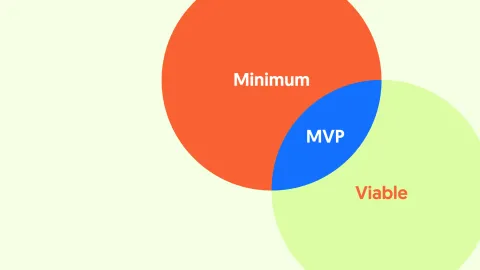Software vendor selection checklist: insights from 100+ pitches

We have participated in more than 100 pitches and, based on our experience, we have compiled a comprehensive vendor selection checklist available for download (download checklist). In addition, we provide a detailed explanation for each selection criteria and offer expert recommendations on how best to evaluate software vendors.
Selecting the right software vendor is difficult
When companies and organisations request proposals (RFP) or quotations (RFQ) for individual development projects, they often receive a wide variety of concepts and offers from different vendors.
It can be very difficult to choose the right vendor because often organisations don’t know how to ask the right questions in order to get the relevant information they need.
Furthermore, many vendors have professional sales teams that provide engaging offers, but fall short when it comes to delivering the proposed solutions.
At 1xINTERNET, we have participated in over 100 pitches and have a wealth of experience competing against other vendors.
We also have extensive experience in taking over the projects where previous vendors have not been able to meet the necessary standards and ensure the success of the project.
Below we provide guidance for companies and organisations how to better select individual software development vendors.
What to consider when selecting a software vendor?
We have compiled a comprehensive software vendor evaluation checklist with the most important factors for companies and organisations to consider when selecting a software vendor.
Below, you will find the explanation for each selection criteria and expert recommendations on how best to evaluate software vendors.

Expertise and experience
Ensure the partner has expertise in the technologies and platforms relevant to your project. If specific domain knowledge is needed it is important to work with a partner with experience in your specific industry. This can speed up development, as this can provide valuable insights and domain knowledge.
Our recommendation: review their previous projects to assess the quality and relevance of their work.
Reputation and references
It is wise to check reviews and testimonials from previous clients to gauge satisfaction and reliability. Ask for detailed case studies that highlight their problem-solving skills and project outcomes.
Our recommendation: speak directly with past clients to get first hand feedback on their experience.
Necessary know-how available in the team
Many providers work with subcontractors and do not have the necessary know-how for project implementation within their own team.
Our recommendation: have the providers show you comparable solutions and speak directly to the developers who created these solutions.
Scalable development team setup
When working against tight deadlines or in larger software projects it can be important to expand the teams for certain time periods. Sometimes you also have to replace team members, for example because of illness or termination.
This is best achieved when software is created according to standards and all team members follow the same architectural and procedural guidelines. Often, insufficient attention is paid to standards and reusability, making it difficult for new team members to become productive.
Your software vendor should have at least twice as many developers available than are required for your project.
Our recommendation: ask the providers to show you examples of how teams have been scaled and talk directly to the developers who were involved in the scaling.

Collaboration and transparency
Verify the availability of effective communication channels and regular updates. There should be clear procedures on how projects are organised, communication is managed, meetings are executed, and changes are agreed upon. All processes should be accompanied by a suitable tool set. Also, ensure the partner is transparent about their processes, timelines, and pricing.
Our recommendation: interview project managers and developers to verify the effectiveness of the collaboration procedures.
Quality assurance and post launch support
Ensure that your vendor has robust and standardised testing and quality assurance processes in place. Verify the data security measures they take to protect your sensitive information. Make sure the vendor offers appropriate support and maintenance services after the project is completed. They should have clear procedures in place that define their responsiveness to issues and ability to provide timely updates and bug fixes.
Our recommendation: interview members of their DevOps and support teams to learn about their tools and maintenance procedures.

Intellectual property
Ensure that you have all relevant usage rights for development activities and that necessary agreements are in place. Ownership, all copyright, and other rights of use in the work results should be created with you as owner or transferred to you when the software is delivered. All software creation and framework contracts should be completely standardised.
Our recommendation: review example framework and project contracts prior to engaging with the vendor.
Minimise risk and cost for the first project
Ensure that the selected providers can deliver the solutions you want within an appropriate timeframe and budget. Enforce the MVP approach for software creation. The vendor should first create a working base system within a fixed budget and time frame. Only after this base system is complete should you estimate the features that set your project apart from similar projects. Once a functional basic system is available, estimating critical functions becomes much easier.
Our recommendation: for all projects make the providers create a complete basic system with a comparable range of functions before you start estimating the costs for customisations (MVP approach).
How to work with the evaluation checklist
We recommend addressing all items on the checklist. Assessing whether vendors fulfill the checklist requirements can be challenging. Therefore, we have outlined recommended procedures to gather this information effectively. These should be followed.
It is not necessarily problematic if a vendor does not fulfill all checklist items. Sometimes, small teams without extensive experience can provide solutions that are just as good as those from larger, more experienced teams. But buyers should be aware of this and make informed decisions accordingly.
Other highlights
Using a MVP approach for web projects

At 1xINTERNET we use a MVP (Minimum Viable Product) approach for delivering successful web projects...
Why choose open source over proprietary software for enterprise projects

We often get asked what open source software is and why companies prefer it over proprietary...